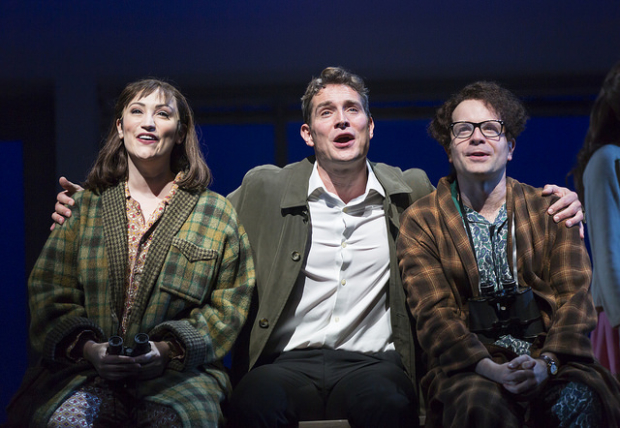Merrily We Roll Along
A cult favorite musical by Stephen Sondheim is imported from London to the Huntington stage.

(© T. Charles Erickson)
Boston’s fall season has opened with the Huntington Theatre‘s import of the lesser-known Stephen Sondheim-George Furth musical Merrily We Roll Along, directed by Maria Friedman in London. The splendid company includes two of the leads from her well-reviewed West End mounting, a number of local actors in supporting roles, and a nine-piece orchestra.
When Merrily first premiered on Broadway in 1981, it famously ran for only 16 performances, despite the success of Sondheim’s Sweeney Todd: The Demon Barber of Fleet Street, which preceded it. Merrily We Roll Along has since lurked in the shadows, beloved by only the most devoted Sondheim fans.
Given the reception of the revival in London, this impressive production can join the canon of Sondheim favorites, especially for its intricate score, and songs that plumb the changing relationships of three friends dialing back to their youthful aspirations.
Based on the 1934 play of the same name by George S. Kaufman & Moss Hart, Sondheim and Furth followed their lead and told the story in reverse chronological order, having the audience meet the trio as adults. Franklin Shepard (Mark Umbers) is a successful composer who sells out his two best friends: playwright collaborator Charles Kringas (Damian Humbley) and novelist-critic Mary Flynn (Eden Espinosa).
The show winds back from a raucous Hollywood party in 1976 to New York in 1957, when the three were young and idealistic, aiming to "change the world." Along the way, Sondheim and Furth incorporate salient references to American history as markers of changing times and attitudes, including the end of the Vietnam War, the Supreme Court's Roe v. Wade decision, and a downtown cabaret act about the Kennedys in the White House (staged when Shepard and Kringas were struggling writer-performers).
This is where Frank meets and marries his first wife, Beth (Jennifer Ellis), only to ditch her 10 years later for the glamorous Broadway star Gussie Carnegie (Aimee Doherty), who leaves her boorish producer husband, Joe Josephson (an imposing Christopher Chew), for this new romance. Maurice Emmanuel Parent, Robert Saoud, and Patrick Varner take on multiple roles with aplomb while also singing and dancing in the ensemble.
Though it would be easy to mark Frank as greedy and disloyal, his friendship with Charley is complex. Charley cannot understand his pal’s desire for money and the trappings of fame. At age 31, they finally have a hit on Broadway, but not with the show that was their labor of love. To Charley’s dismay, Frank is increasingly pulled from their working days together by the distractions of other lucrative offers and the illicit love affair leading to his messy divorce from Beth.
Humbley offers an indelible performance as Charley. His rendition of "Franklin Shepard, Inc." reveals a tsunami of pain. He is matched in poignant resonance by Ellis in Beth’s lament, "Not a Day Goes By." Doherty reigns triumphant at winning both super-stardom and Beth’s husband in the "Musical Husbands Finale" (a version of the song "Good Thing Going"). Espinosa's Mary is an older, bitter drunk when we first meet her, but makes a remarkable transformation into a twentysomething wannabe author though a series of songs, starting with the Act 1, two-part number "Growing Up." Shepard as Frank is an actor-performer with the charisma of an old-time matinee idol, but manages to expose the cracks of a character wracked with guilt and regrets.
Director Maria Friedman, an experienced performer who appeared in a U.K. version of Merrily in the '90s, helps capture the emotional arc of the characters. Friedman is aided by choreographer Tim Jackson, who swiftly commands a 21-member ensemble. Soutra Gilmour's sophisticated set of an elegant Hollywood mansion is designed to change shape and place depending on the scene. Gilmour has also devised costumes that reflect the changing styles of the decades.
With the cast under Friedman’s sensitive guidance, this production projects the traumas and the joys of growing up and attaining wisdom — no matter the cost— and elevates it into the rarefied circle of Sondheim’s most memorable works.









